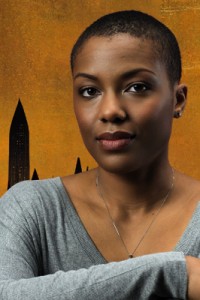M.K. Hobson: Bustlepunk
 Mary Catherine Koroloff was born in Riverside CA and grew up in Portland OR. She attended the University of Oregon, where she studied English and Film. Finding film-related work in Portland was difficult, and she didn’t want to move to Los Angeles, so she went into the marketing field. She worked for a creative marketing agency for six years before becoming a freelance marketing consultant in 2006. She married Daniel Hobson in 1997, and they have a daughter, Nora, born in 1998. They live in Oregon City OR.
Mary Catherine Koroloff was born in Riverside CA and grew up in Portland OR. She attended the University of Oregon, where she studied English and Film. Finding film-related work in Portland was difficult, and she didn’t want to move to Los Angeles, so she went into the marketing field. She worked for a creative marketing agency for six years before becoming a freelance marketing consultant in 2006. She married Daniel Hobson in 1997, and they have a daughter, Nora, born in 1998. They live in Oregon City OR.
Hobson published some stories in small press magazines as Mary Catherine Koroloff in the ’90s, but her first professional sale under the name M.K. Hobson was ‘‘Daughter of the Monkey God’’ in Sci Fiction (2003); she’s published over 30 stories in all. First novel The Native Star will appear September 2010, to be followed by a sequel sometime in 2011. Both books are set in an alternate, magical 1870s America. She describes the books as ‘‘New Weird West Bustlepunk,’’ and in 2009 wrote ‘‘The Bustlepunk Manifesto’’, a tongue-in-cheek essay urging the recognition of a new speculative sub-genre related to steampunk, but with an emphasis on social drama, fashion, etiquette, and manners.
Hobson co-edits ’zine Diet Soap with fellow Oregon writer Douglas Lain, and co-hosts fantasy podcast Podcastle.
“Some of my early short fiction appeared under my full name, but I had this feeling that writing science fiction under a clearly identifiable female name would be a handicap. (I’m not sure if I still believe that, but a lot of women in science fiction have adopted, and still adopt gender-neutral publishing names, so I know I’m not the only one on this boat.) So I changed to M.K. Hobson, and that’s what I write under now.
“I’ve been writing ever since I was a kid. I think I started writing after Star Wars came out in ’77 – that would have made me eight years old. I remember watching the movie and thinking, ‘If I could just live a life that was like that…!’ But (and I think this is where the writing part came from) I was dissatisfied with the milieu of the story. The laser blasters, the starships – they weren’t the right furniture for my fantasy. While I liked the feeling of what the story did and how I could immerse myself in it, there were elements I wanted to adjust to my own liking. The writing came from wanting to create a world that satisfied the sense of adventure and the visceral response I had to that story but that hit the marks of what I was interested in.”
…
“The writers I feel closest to are those I would classify as underappreciated fantasists and science fiction writers. I’ve mentioned Sinclair Lewis; he wrote It Can’t Happen Here, which could be classed as either science fiction or alternate history. There’s also James Thurber, who is definitely understood to be a fantasist, but he gets a lot of mainstream cred as well. With a Sinclair Lewis or a Thurber, the fantasy is secondary; it’s not the center of what’s important in the story. It’s like a delicate spice. I like a little taste of fantasy better than a whole big plate of it. People who say, ‘I’m going to build the kind of world I want’ – that doesn’t turn my crank as much as, ‘What can I say about this world?’ I don’t want to escape. I don’t care about escape.”
…
 “Originally, the novels I sold to Bantam – The Native Star and its sequel, the title of which my editor Anne Groell and I are still hashing out – were going to come out in spring of ’10, then the summer of ’10, and now the first one has been pushed to fall. They’re standalone novels – you could read one without reading the other – but they were written as a duology and they work better together than apart. I’m an American history buff, and I knew that I wanted to write about America in the 1870s, which was really a turning point for our nation. The westward expansion was largely a fait accompli, and by 1876, there was a need to bring all those people together, to build an American ‘mythology’ that would unite coast with coast. Because without that kind of mythology, you couldn’t have had the kind of expansion of wealth and industry that ultimately followed. So the science of mass-marketing was developed. The foundations were being laid for what would become the kind of mass communication we see today. Disposable popular media, such as newspapers and pulp novels, started to become an integral part of the cultural landscape.
“Originally, the novels I sold to Bantam – The Native Star and its sequel, the title of which my editor Anne Groell and I are still hashing out – were going to come out in spring of ’10, then the summer of ’10, and now the first one has been pushed to fall. They’re standalone novels – you could read one without reading the other – but they were written as a duology and they work better together than apart. I’m an American history buff, and I knew that I wanted to write about America in the 1870s, which was really a turning point for our nation. The westward expansion was largely a fait accompli, and by 1876, there was a need to bring all those people together, to build an American ‘mythology’ that would unite coast with coast. Because without that kind of mythology, you couldn’t have had the kind of expansion of wealth and industry that ultimately followed. So the science of mass-marketing was developed. The foundations were being laid for what would become the kind of mass communication we see today. Disposable popular media, such as newspapers and pulp novels, started to become an integral part of the cultural landscape.
“Tthe magic system I built for the novels is called Credomancy, and it’s predicated on the fact that what the majority of people believe is what drives reality. If enough people believe that werewolves can be killed by silver bullets, then werewolves can be killed by silver bullets. In my version of history, over time, power is accrued by groups or institutions that are most skilled at building communication structures that allow them to define reality for the greatest number of people. (The example I use in The Native Star is the Catholic Church.) If you magically democratize the creation of reality, then you get to play with all sorts of really interesting problems – the same problems that you see with regular, mundane, everyday democracy… corruption, influence peddling, lobbying, the whole nine yards.”
…
“I’m all for people being exposed to threatening ideas. I’ve looked at websites of the 9-11 Truth Movement, and many people found it threatening that I was simply exploring it. But no matter how odious an idea is… whether it’s Neo-Nazi propaganda, or Glenn Beck, or even that Ann Coulter… I’ll read it. I’ll read it because I feel compelled to do a reality check on it. I want to understand what these people are saying. What is their proof? What facts are they presenting? What is their rationale? I’m always interested in the rationale of anybody’s beliefs, no matter how wacky they seem. I’m fascinated by what other people think the truth is, and how they justify it to themselves.”



 Website:
Website: Excerpts from the interview:
Excerpts from the interview:



Pingback:Tweets that mention Locus Online Perspectives » M.K. Hobson: Bustlepunk -- Topsy.com
Pingback:Geek Media Round-Up: June 29, 2010 – Grasping for the Wind
Pingback:links for 2010-07-08